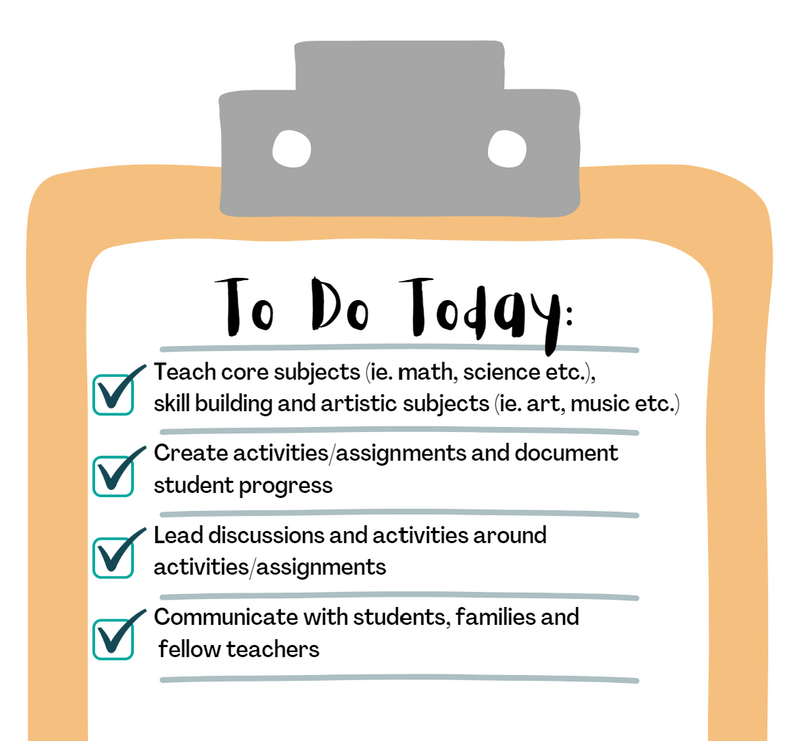Do you enjoy teaching? Are you interested in guiding children to reach their fullest potential? Helping to raise the next generation?
Picture teaching the same group of children for their entire preschool, elementary, or high school journey — getting to know them, and their families well, and teaching life skills.
If this sounds exciting, then becoming a Waldorf teacher may be the career for you!

What do Waldorf Teachers do?
What a Waldorf teacher's day looks like varies depending on what level you teach, as some of the core subjects may vary depending on the level. You can teach at the preschool, elementary, or secondary school level.
Regardless of what level you teach, there are some common daily duties.

As the above image shows, the typical duties of a Waldorf teacher include:
Teaching core subjects (ie. math or science), artistic subjects, and skill building
Creating activities or assignments and documenting progress
Leading discussions and activities
Communicating with students, families, and fellow teachers
Waldorf Schools vs. Public Schools: What's the Difference?
You may be reading this and thinking, "what's so special about Waldorf?". Here's some key differences

As shown in the Venn diagram above:
Public schools
Academics start in kindergarten
Focus on results rather than process
Use of lots of textbooks, tests, and worksheets
Waldorf schools
Academics start in grade 1 or 2
Focus on teamwork and asking questions
Children create their own learning materials
Quiz
True or False: Waldorf teachers use a lot of tests and worksheets.
Why is Waldorf Important?

Waldorf teachers take a more holistic approach to education that focuses on more than just academics. The goal of Waldorf teachers is to nurture competent individuals who:
Create meaning in their lives by focusing on artistic subjects
Become action-oriented by learning many practical life skills
Become freethinkers through the emphasis on discussion, debate, and analysis
Let's get to work!

Where can I work?
Waldorf teachers can work at any of the roughly 130 Waldorf schools in the United States or the about 30 Waldorf schools across Canada.
How do I become a Waldorf teacher?
To become a Waldorf teacher, you'll need some level of education and specific Waldorf teacher training, depending on where you live and what level you'd like to teach. Here's the breakdown:
USA Requirements

Preschool: Waldorf teacher training
Elementary: Bachelor degree and Waldorf teacher training
Highschool: Bachelor degree and Waldorf teacher training
Canada Requirements

Preschool: Early Childhood Educator training and license and Waldorf teacher training
Elementary & High School: Bachelor degree, Bachelor of Education, and Waldorf teacher training
Check out organizations like the Association of Waldorf Schools of North America (AWSNA) to find the availability of Waldorf teacher training near you.
What's the average pay?

The average pay range depends on where you live and what level you teach. In the United States, the average pay is $51, 262, whereas in Canada, the average pay is $71, 301.
Quiz
Julie really wants to become a Waldorf teacher but she only has Waldorf teacher training. Which education level can she teach at a Waldorf school?
Pros and Cons of Waldorf Teaching
If you're still having a hard time deciding whether to become a Waldorf teacher or not, consider the points below:
Pros

A strong sense of community
Encouragement of creativity and curiosity
New and challenging curriculum every year
Cons

Possible lower pay than at public schools
Few extended health benefits (ie. dental care, vision care)
Work to do outside of work hours (class prep, meeting parents, etc.)
Take Action

Are you ready to start your journey as a Waldorf teacher? Here are some steps you can take to get started:
Your feedback matters to us.
This Byte helped me better understand the topic.

